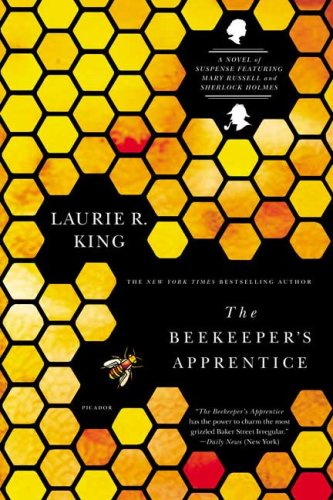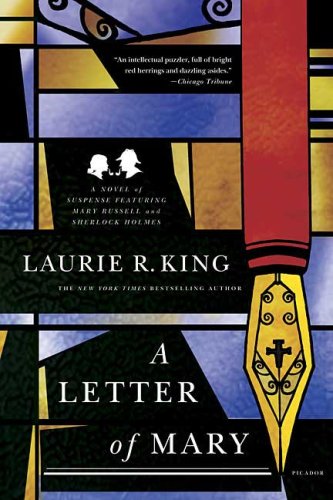
The first novel begins in 1915. Rather than write new adventures for Sherlock Holmes set after his retirement to Sussex, Holmes and his methods became background to a new detective of a new generation. Mary Russell, born in 1900, is of a different generation from Holmes, and grows to epitomize changing women’s roles from World War One up through the 1920s just as Holmes is tightly tied to the Victorian period.
Russell narrates most of the novels entirely in first-person, keeping the reader in her confidence (except when she’s deliberately keeping secrets). Because of her close relationship with Holmes and her own skills as a detective, she can also give an intimate view of Holmes. This is a contrast to the canon Holmes stories, which only present the detective from Watson’s “everyman” point of view. Because of those differences, King is able to dialogue with the relentlessly masculine Holmes canon as well as create new adventures in a new world.

Another conceit of the series is that they are manuscripts written by Russell in her old age, which aligns with the original Holmes canon being stories written by Dr. Watson. Unlike the Holmes stories, however, the reader gets to see Russell grow up, and see how she achieves her extraordinary skills. She’s fifteen in the first novel and has been orphaned; Holmes becomes her mentor and trains her in his methods of deduction as well as many associated skills. Later, however, Russell attends Oxford University where she studies, among other things, chemistry and theology.
Russell’s religious beliefs and knowledge of theology are the biggest contrast between her character and that of Holmes, who is relentlessly rooted in the concrete. To me, religious belief is the aspect of Russell’s character is the richest in terms of keeping my love for the character fresh. King does an admirable of job of integrating what might seem dry academic material into complex, intriguing mysteries, giving them much more moral and ethical depth. Russell is fascinated by her academic specialty and how it relates to the real world so, by default, the reader can’t help but also be interested.
In short, though these novels include Sherlock Holmes as a character, and extrapolate his future into the 1920s, I don’t really consider them to be about Holmes. The series is firmly focused on Mary Russell, dominated by her voice and her opinions. If you enjoy reading about the history and literature of the early twentieth century, you might want to give the Mary Russell series a try.
A side note – as a fan of genre literature, I love the occasional cameos (or larger roles!) of historical figures or literary characters other than Holmes. Russell meets Sabine Baring-Gould, J. R. R. Tolkien, Kim from the Rudyard Kipling novel of the same name, T. E. Lawrence, Edmund Allenby, Dashiell Hammett, and, though he’s unnamed, Peter Wimsey from Dorothy Sayers’ mystery novels. I’m very much looking forward to reading the newest in the series, The Pirate King, which revolves around silent films. I’m expecting a few more cameos in it!
Victoria Janssen is the author of three erotic novels and numerous short stories. Her latest novel is The Duke and The Pirate Queen from Harlequin Spice. Follow her on Twitter: @victoriajanssen or find out more at victoriajanssen.com.

You have pinpointed exactly what I love about these books: They’re not trying to be about Holmes.
The cameos are a lot of fun for me too! I giggled so hard when I identified Lord Peter that I had to put the book down and go tell somebody how fantastic it was.
I found these books quite by accident on my own when I saw the title in a bookstore when I was waiting on someone else to make a purchase. I have been hooked ever since.
I enjoyed your review and agree with the things that caught your eye. I like her other series too.
Thanks for this article. I wasn’t aware of these Mary Russell novels so will try and pick up a copy of the Beekeeper’s Apprentice. Re Sherlockiana I really enjoyed Mark Frost’s novels featuring Arthur Conan Doyle and Jack Sparks.
Thanks for your comments!
@shollinghurst, I read one of the Mark Frost novels – didn’t realize there were more!
I read the something of the Seven by Mark Frost, maybe list of… Not bad!
I do love the Russell books. I love Mary Russell’s independence and how Holmes treats her as an equal. I also love to get lost in the adventure of the stories. I haven’t tried the Mark Frost books yet.
@DeborahLacy, as I mentioned above, I read one of the Frost books – it was an interesting take on the canon – much darker than I had expected.